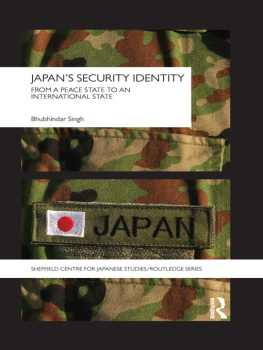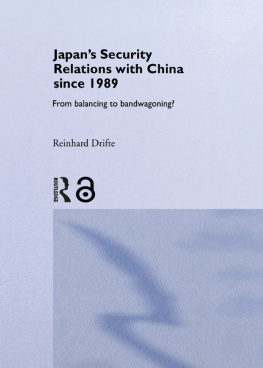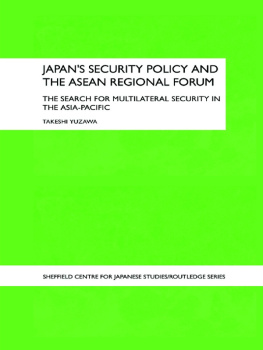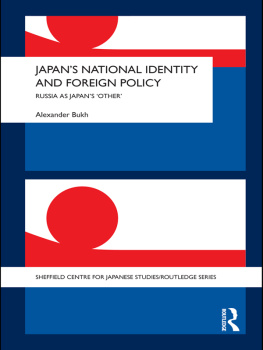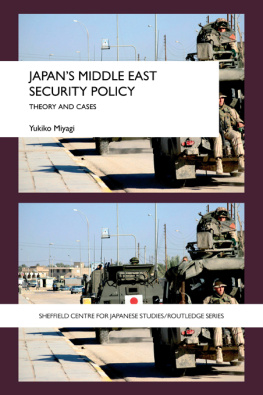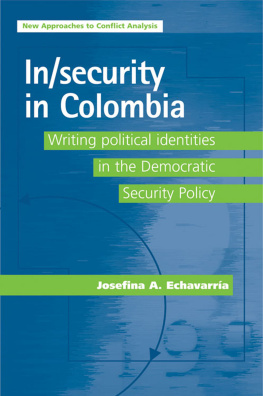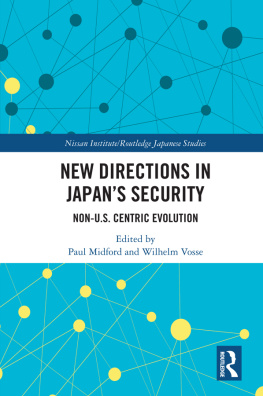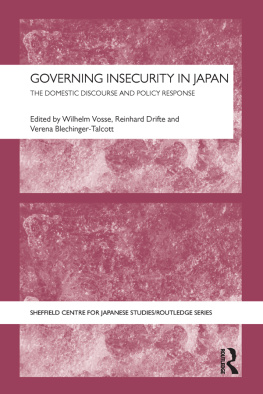Japans Security Identity
Since the end of the Cold War, there has been a significant change in Japanese security policy, as Japans security identity has shifted from a peace state to an international state. In this book, Bhubhindar Singh argues that from the 1990s onwards, the Japanese security policymaking elite recognized that its earlier approach to security policy which was influenced by the peace-state security identity was no longer appropriate. Rather, as a member of the international community, Japan had to carve out a responsible role in regional and international security affairs, which required greater emphasis on the role of the military in Japans security policy.
To explore the change in Japans security identity and its associated security behaviour, this book contrasts the three areas that define and shape Japanese security policy: Japans conception (or definition) of national security; the countrys contribution, in military terms, to regional and international affairs; and the changes to the security policymaking regime responsible for the security policy formulation. Further, it seeks to challenge the dominant realist interpretation of Japanese security policy by adopting an identity-based approach and showing how while realist accounts correctly capture the trajectory of Japanese post-Cold War security policy, they fail to explain the underlying causes of the change in Japanese security behaviour in the post-Cold War period.
This book is an important addition to the current literature on Japanese security policy, and will be of great use to students and scholars interested in Japanese and Asian politics, as well as security studies and international relations more broadly.
Bhubhindar Singh is Assistant Professor and Deputy Head of the Centre of Multilateralism Studies at the S. Rajaratnam School of International Studies, Nanyang Technological University, Singapore.
Sheffield Centre for Japanese Studies / Routledge Series
Series Editor: Glenn D. Hook
Professor of Japanese Studies, University of Sheffield
This series, published by Routledge in association with the Centre for Japanese Studies at the University of Sheffield, both makes available original research on a wide range of subjects dealing with Japan and provides introductory overviews of key topics in Japanese Studies.
1. The Internationalization of
Japan
Edited by Glenn D. Hook
and Michael Weiner
2. Race and Migration in
Imperial Japan
Michael Weiner
3. Japan and the Paci fi c Free
Trade Area
Pekka Korhonen
4. Greater China and Japan
Prospects for an economic
partnership?
Robert Taylor
5. The Steel Industry in Japan
A comparison with the UK
Hasegawa Harukiyo
6. Race, Resistance and the Ainu
of Japan
Richard Siddle
7. Japan s Minorities
The illusion of homogeneity
Edited by Michael Weiner
8. Japanese Business Management
Restructuring for low
growth and globalization
Edited by Hasegawa Harukiyo
and Glenn D. Hook
9. Japan and Asia Paci fi c
Integration
Pacific romances 196896
Pekka Korhonen
10. Japan s Economic Power and
Security
Japan and North Korea
Christopher W. Hughes
11. Japan s Contested Constitution
Documents and analysis
Glenn D. Hook and Gavan
McCormack
12. Japan s International
Relations
Politics, economics and
security
Glenn D. Hook, Julie Gilson,
Christopher W. Hughes and
Hugo Dobson
13. Japanese Education Reform
Nakasones legacy
Christopher P. Hood
14. The Political Economy of
Japanese Globalisation
Glenn D. Hook and
Hasegawa Harukiyo
15. Japan and Okinawa
Structure and subjectivity
Edited by Glenn D. Hook
and Richard Siddle
16. Japan and Britain in the
Contemporary World
Responses to common issues
Edited by Hugo Dobson
and Glenn D. Hook
17. Japan and United Nations
Peacekeeping
New pressures, new responses
Hugo Dobson
18. Japanese Capitalism and
Modernity in a Global Era
Re-fabricating lifetime
employment relations
Peter C. D. Matanle
19. Nikkeiren and Japanese
Capitalism
John Crump
20. Production Networks in Asia
and Europe
Skill formation and
technology transfer in the
automobile industry
Edited by Rogier Busser
and Yuri Sadoi
21. Japan and the G7/8
19752002
Hugo Dobson
22. The Political Economy of
Reproduction in Japan
Between nation-state and
everyday life
Takeda Hiroko
23. Grassroots Paci fi sm in
Post-War Japan
The rebirth of a nation
Mari Yamamoto
24. Inter fi rm Networks in the
Japanese Electronics Industry
Ralph Paprzycki
25. Globalisation and Women in the
Japanese Workforce
Beverley Bishop
26. Contested Governance in Japan
Sites and issues
Edited by Glenn D. Hook
27. Japan s International
Relations
Politics, economics and
security, second edition
Glenn D. Hook, Julie Gilson,
Christopher W. Hughes and
Hugo Dobson
28. Japan s Changing Role in
Humanitarian Crises
Yukiko Nishikawa
29. Japan s Subnational
Governments in International
A ff airs
Purnendra Jain
30. Japan and East Asian
Monetary Regionalism
Towards a proactive
leadership role?
Shigeko Hayashi
31. Japan s Relations with
China
Facing a rising power
Lam Peng-Er
32. Representing the Other in
Modern Japanese Literature
A critical approach
Edited by Rachael Hutchinson
and Mark Williams
33. Myth, Protest and Struggle
in Okinawa
Miyume Tanji
34. Nationalisms in Japan
Edited by Naoko Shimazu
35. Japan s Security Policy
and the ASEAN Regional
Forum
The search for multilateral
security in the Asia-Pacific
Takeshi Yuzawa
36. Global Governance and
Japan
The institutional architecture
Edited by Glenn D. Hook
and Hugo Dobson
37. Japan s Middle East
Security Policy
Theory and cases
Yukiko Miyagi
38. Japan s Minorities
The illusion of homogeneity,
second edition
Edited by Michael Weiner
39. Japan and Britain at War
and Peace
Edited by Nobuko Kosuge
and Hugo Dobson
40. Japan s National Identity and
Foreign Policy
Russia as Japans other
Alexander Bukh
41. Japanese Cinema and
Otherness
Nationalism, multiculturalism
and the problem of
Japanesenesss
Mika Ko
42. Asian Regionalism and Japan
The politics of membership
in regional diplomatic,
financial and trade groups
Shintaro Hamanaka
43. Decoding Boundaries in
Contemporary Japan
The Koizumi Administration
and beyond

